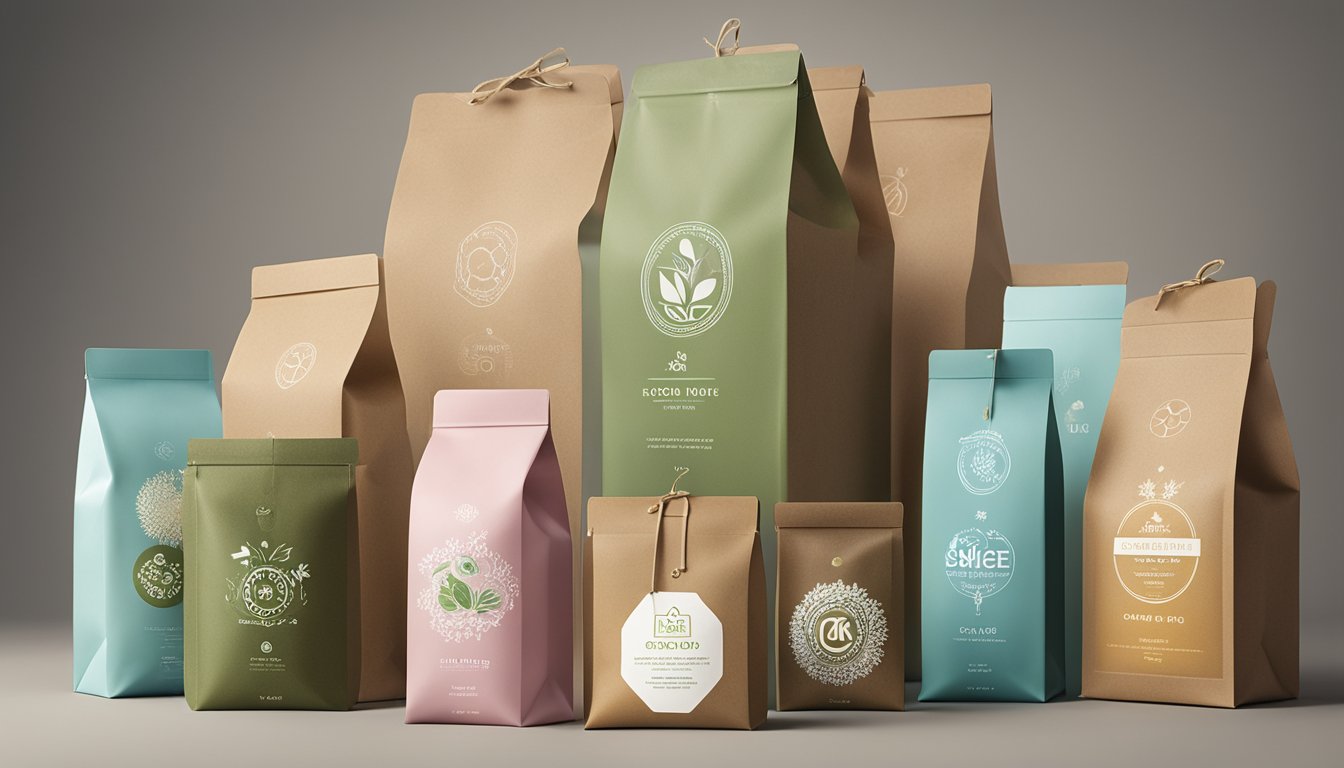Late updated: 21 Apr 2025 09:04
Written by: Amber Collins
Innovative Sustainable Packaging Ideas For UK SMEs: Boosting Eco-Friendly Practices
In the rapidly evolving world of business, sustainability is no longer just an option; it is a necessity. With an increasing number of consumers becoming environmentally conscious, UK SMEs must adapt by rethinking how they package their products. Embracing sustainable packaging methods not only benefits the environment but also enhances brand reputation and meets consumer demand.

Our journey into innovative packaging solutions reveals exciting possibilities, from compostable materials to edible wrappers. These options not only reduce waste but also cater to the eco-friendly preferences of mindful consumers. By implementing these creative solutions, small businesses in the UK can set themselves apart in a competitive marketplace.
The future of packaging is bright and green, offering countless opportunities for innovation. By prioritising sustainable practices, SMEs can lead the way in eco-friendly business solutions. Embracing innovation in packaging not only aligns with global sustainability goals but also opens doors to new markets and customer loyalty.
Key Takeaways
- Sustainable packaging enhances brand reputation.
- Innovative solutions offer competitive advantages.
- Eco-friendly practices appeal to conscious consumers.
Fundamentals of Sustainable Packaging for UK SMEs
UK SMEs can benefit from adopting sustainable packaging by reducing environmental impact, conserving resources, and enhancing brand reputation. By focusing on key principles, understanding environmental impacts, and implementing sustainable strategies, businesses can make significant strides toward eco-friendly packaging solutions.
Key Principles of Sustainable Packaging
To achieve sustainable packaging, we should prioritise three main principles: reducing, reusing, and recycling. Reducing materials minimises waste generation and cuts down on packaging costs. Reusing involves designing packaging that can be used multiple times, thereby lessening the need for single-use packaging.
Recycling incorporates materials that are easy to recycle, promoting a circular economy. It's essential to choose packaging materials that are compostable or biodegradable, reducing their carbon footprint. Engaging with these principles not only aids sustainability but can also enhance our brand's eco-friendly image.
Understanding Environmental Impact and Reducing Waste
Assessing the environmental impact of our packaging choices is crucial. We must understand how packaging materials affect ecosystems and contribute to environmental degradation. Selecting eco-friendly packaging options ensures that we lower both waste generation and emissions.
Biodegradable materials and recyclable materials are central to reducing waste. They break down more easily or can be repurposed, reducing their environmental footprint. By conducting life cycle assessments, we can identify weaknesses in current packaging practices and address them effectively.
Sustainable Strategies for Small Businesses
Implementing sustainable strategies begins with sourcing eco-friendly materials that align with our brand values. We should opt for environmentally friendly packaging that supports sustainability, like using recyclable materials and reducing single-use packaging.
Collaboration with local suppliers can help ensure that the journey from raw material to final product remains as carbon-efficient as possible. Educating our customers about proper recycling practices further enhances our commitment to sustainability. By doing so, we contribute to a more informed customer base while extending our impact beyond the product itself.
Innovative Packaging Solutions and Emerging Trends

Innovation in sustainable packaging is reshaping how UK SMEs approach their environmental responsibilities. By embracing eco-friendly materials, minimal designs, and smart technologies, businesses can enhance both practicality and customer engagement.
Eco-Friendly Packaging Materials and Design
In the realm of eco-friendly materials, biodegradable and compostable options are gaining momentum. Recycled materials help reduce waste and limit the environmental footprint. SMEs in the UK are increasingly turning to bioplastics, which are designed to break down more easily than traditional plastics, reducing the impact of microplastics.
Creative design also plays a vital role. By blending functionality with sustainable practices, businesses can offer packaging that is both attractive and responsible. Handmade beauty products and gift boxes incorporating natural ingredients align with this trend. This shift not only benefits the environment but appeals to the growing consumer demand for more ethical products.
Reusable and Minimal Packaging Concepts
Minimal packaging focuses on using fewer resources, thus reducing shipping costs and overall waste. By adopting innovative packaging solutions that eschew unnecessary embellishments, SMEs can economise while promoting sustainability.
Reusable packaging, such as durable containers or wraps, offers additional value by extending product life and fostering customer loyalty. Encouraging customers to participate in sustainable initiatives by returning or reusing packaging can enhance the customer experience, providing an avenue for engaging with millennials and Gen Z audiences who prioritise environmental concerns.
Smart and Interactive Packaging Ideas
The use of smart technologies in packaging transforms simple containers into interactive experiences. Features such as QR codes or Near Field Communication (NFC) tags can connect customers with digital content like product information, usage tips, or a company's sustainable practices.
These technologies not only inform but can also solidify brand loyalty by integrating green marketing initiatives. For instance, a video that tells the story of a product’s natural ingredients or small-batch production can deepen customer engagement. Interactive packaging not only enhances utility but aligns with the tech-savvy preferences of younger generations.
Green Marketing and Customer Engagement
Green marketing strategies target the growing segment of eco-conscious consumers. By clearly communicating the benefits of sustainable packaging, businesses can differentiate themselves in competitive markets. Highlighting the use of recycled materials or eco-friendly designs promotes a positive brand image.
SMEs can leverage this approach to build trust and deepen relationships with customers. Engaging stories about ethical production, reduction of carbon footprint, and continued commitment to sustainability resonate well. The focus on sustainability in this sphere strengthens the connection between brand and consumer, impacting purchasing behaviours positively.
Frequently Asked Questions

As we explore sustainable packaging solutions for SMEs in the UK, we address key questions about biodegradable options, circular economy principles, incentives, and design trends that attract eco-conscious consumers.
What are the leading biodegradable packaging options suitable for small to medium businesses in the United Kingdom?
Biodegradable packaging options include materials like compostable mailers, kraft paper, and products made from recycled materials. These options not only help in reducing environmental impact but also align with growing consumer expectations for eco-friendly practices.
How can SMEs effectively integrate circular economy principles into their packaging strategies?
SMEs can adopt circular economy principles by designing packaging that is reusable, recyclable, or biodegradable. Partnering with suppliers that prioritise sustainable materials and implementing take-back or recycling programmes can boost circularity.
What grants or incentives are available for UK-based SMEs that adopt eco-friendly packaging solutions?
There are several grants and incentives for UK SMEs investing in sustainable packaging, such as funding from Innovate UK. Businesses can also explore tax relief schemes and local government initiatives aimed at promoting environmental sustainability.
What are the key considerations for small businesses when transitioning to sustainable packaging materials?
When transitioning, SMEs should assess the cost implications, availability, and performance of sustainable materials. It's crucial to balance sustainability goals with business needs, ensuring that packaging protects products while minimising environmental impact.
How can SMEs measure the environmental impact of their packaging choices?
SMEs can utilise life cycle assessments (LCAs) to quantify the environmental impact of different packaging materials. Additionally, tracking metrics such as carbon footprint, waste reduction, and recycling rates can offer insights into sustainability performance.
Can you suggest innovative packaging design trends that both reduce waste and appeal to environmentally conscious consumers?
Trends such as minimalistic designs using natural inks, and multi-functional packaging that can be repurposed are gaining traction. Transparent communication of sustainable practices through packaging design also resonates with consumers who value eco-friendliness.
